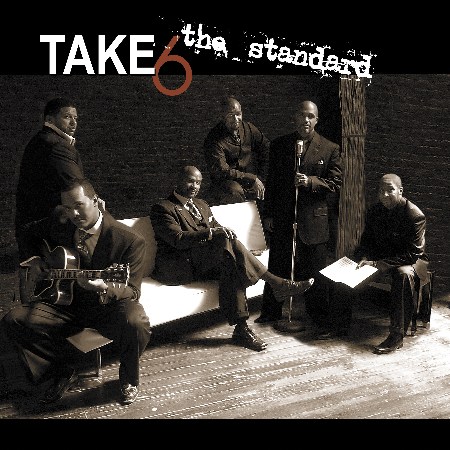
 When
a group scored two GRAMMY-Awards with a debut-album, that must be
something special. The a capella jazz group Take 6 was successful in
getting these desirable awards twice. Perhaps because the group presents a
unique style, often copied but never reached. In the following time
they scored further GRAMMY-awards for their albums So Much 2 Say
(1990), He Is Christmas (1991), Join The Band (1994)
and Brothers (1996).
When
a group scored two GRAMMY-Awards with a debut-album, that must be
something special. The a capella jazz group Take 6 was successful in
getting these desirable awards twice. Perhaps because the group presents a
unique style, often copied but never reached. In the following time
they scored further GRAMMY-awards for their albums So Much 2 Say
(1990), He Is Christmas (1991), Join The Band (1994)
and Brothers (1996).
Today's the
sextet consists of the singers Mark Kibble, Claude V. McKnight III,
Dr. Cedric Dent, David Thomas, Alvin Chea and Joey Kibble. The new
album The Standard is their debut on Heads Up International.
“We go into every
project saying it will be the best,” comments Claude McKight. “At
least the best we’ve ever done, and depending on the concept or the
genre, it may be the best that’s ever been done by anyone. When we
take on a project or step into a new phase of our career, we’re not
afraid to say, ‘Hey, let’s move some mountains.’”
The impetus of the
group is to create an album of jazz standards, "a record that will
stand up as the jazz vocal album for all time". Sweet Georgia Brown
is the best start for this endeavor. This popular song was
composed by Pinkard (music) and Ken Casey (words) in 1925. The song
was first recorded by bandleader Ben Bernie and his Orchestra and
later copied by numerous artists. Take 6 present a perfect rendition
in their own unique vocal style.
Nat King Cole's
recording of his original song Straighten Up And Fly Right was
released in 1943. The story of a monkey and a buzzard echoed on
hundreds of jazz records and find its final highlight in the fusion of
Take 6 and George Benson. "We decided that, for any given song on this
record, we would ask for the person who we thought would make the most
sense for the song,” says McKnight. “And everyone we asked said yes.
We’ve never really had a problem reaching out and finding whomever it
is we wanted. That’s been a blessing for us.”
Miles Davis composed with Victor Feldman Seven Steps To Heaven
for his album So Near So Far (1963). Jon Hendricks, Al
Jarreau and German flugelhornist Till Brönner, whose Bossa Nova album
Rio will be released mid-September 2008, are the special
guest-musicians on this track.
The
Academy-awarded Windmills Of Your Mind (1968), originally
composed for the movie The Thomas Crown Affair is the further
delicacy on Take 6's menu carte. George Gershwin composed Someone
To Watch Over Me for the musical Oh, Kay (1926). Take 6's
rendition features the superb singer Shelea Frazier. A big talent
we'll certainly see again in near future. Roy Hargrove's trumpet is
unsurpassed.
Back To You
is Take 6's gorgeous approach to R&B and soul. There is some Marvin
Gaye in the air. Sit back and wonder: Ella Fitzgerald's voice revives
on A Tisket A Tasket, created in the studio using her original
vocal from the classic 1938 Decca Records 78. Although one recognizes
the technical progress of recording, Take 6 masterly integrates Ella's
voice into their concept.
Bein' Green
was written by Joe Raposo for the Sesame Street originally performed
by Kermit, the frog. According Wikipedia the song is associated with
problems with identity, and failure of individuality. Foremost it's a
funny interlude with a serious background.
Do You Know
What It Means To Miss New Orleans?, a song by Eddie DeLange and
Louis Alter, was first time performed by Louis Armstrong in the
movie New Orleans (1947). Since many years a jazz standard, this
version is featuring the legendary Aaron Neville still keep the flair
of old time.
I don't know, how
often artists have covered Marvin Gaye 's What's Going on?
Especially the Smooth Jazz saxophonists extremely appreciate this
tune. For example Everette Harp released in 1997 What's Going On,
a tribute to Marvin Gaye's classic 1971 album as part of Blue Note's
cover series. A compelling solo artist in his own right, the guitarist
Doc Powell received a Grammy nomination for his 1987 interpretation of
this Marvin Gaye classic. Marvin Gaye had fought hard to get Motown to
release this title. It's an epic song cycle on which Marvin took total
control and weaved his observations about inner city youth, the
ecology, and race relations. A through ball for Take 6.
The traditional
Christian hymn
Shall We Gather At The River was
written by
Robert Lowry in 1864. Who ever can perform this hymn so perfectly
like Take 6 including all octaves male vocals are able to reach. The
album is closed by the lovely ballade Grace, which was created
by Quincey Jones and Jeremy Lubbock as theme for the Olympic
Gymnastics. In addition to the fantastic choir Cedric Dent lays down a
superb groove on piano.
The Standard is
indeed a real jewel for all friends of vocal jazz and a milestone in
the musical history of the a capella jazz group Take 6, vote it for
the next GRAMMY.
